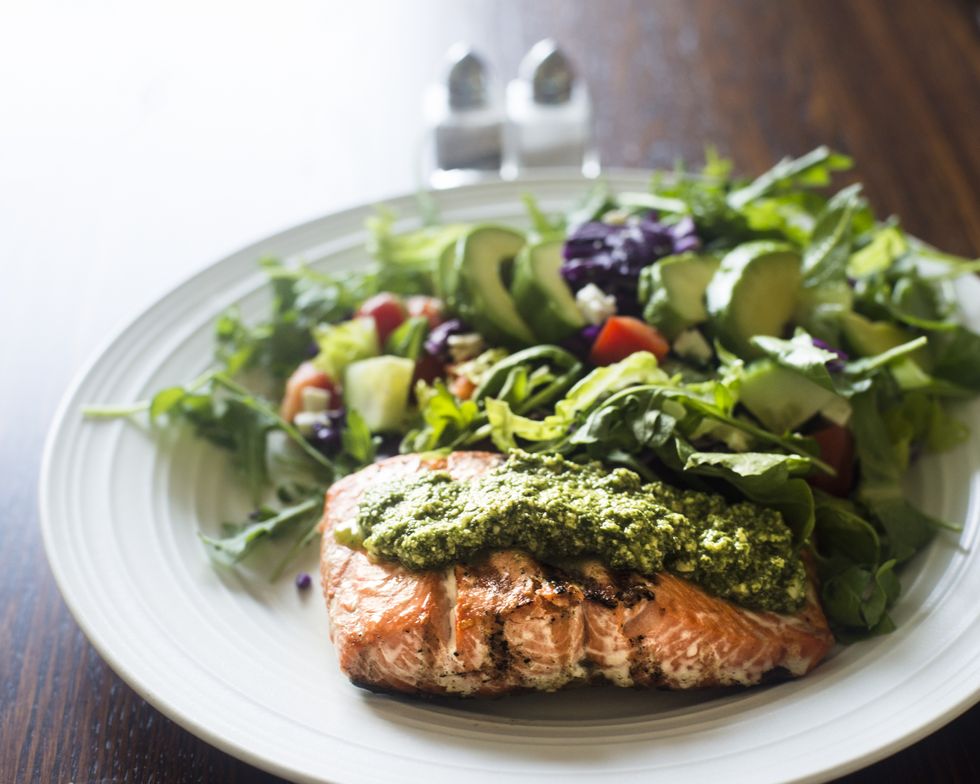Chronic inflammation is one of the main drivers of ageing
Don't Miss
Most Read
Trending on GB News
A top doctor has laid bare exactly what you should do to stop ageing and live longer.
Speaking to Janet Lord, director of the Institute of Inflammation and Ageing at Birmingham University for an upcoming interview set to air on Radio 4 next Friday, Dr Michael Mosley outlined six tips to help people stop their biological clock.
Mosley explained that one of the best things you can do is pay attention to what experts are calling your “inflammage”.
The portmanteau of inflammation and age has been the cause of recent interest among experts as research suggests chronic inflammation is one of the main drivers of ageing.

‘I’m a doctor and these are the six things I do to stop ageing and live longer’
Getty Images
Writing for Mail Online, Dr Mosley claims that keeping inflammation levels as low as possible will help slow ageing and allow you to live longer and healthier.
He adds that although we all have some inflammation somewhere, people should aim to keep it low as it can help reduce the risk of heart disease, diabetes, arthritis and dementia.
Lord shared her tips to help reduce ‘inflammaging’ with Mosely who practices the same advice.
Below are the six things you could do to stop your body clock and live longer:

A doctor shared tips for managing chronic inflammation
GETTYSET A MOVEMENT ALARM
The first thing Lord and Mosley suggest is to set a movement alarm as they say that being more active and sitting less can help reduce inflammaging.
Setting an alarm to go off once an hour, can help remind you to get up and take a brief stroll.
One study, conducted by the University of California in 2017 suggested that just one brisk walking session was enough to make a difference.
In the study, 47 participants gave blood before and after a brisk walk on a treadmill for 20 minutes.
Researchers found that the walk was enough to reduce levels of a pro-inflammatory chemical called TNF (tumour necrosis factor).
TNF has been known to trigger chronic inflammation and reportedly plays an important role in immune system defences.
LATEST DEVELOPMENT:

Mediterranean diets can help reduce inflammation
Getty Images
Feed your brain with a ‘MIND’ diet
Another simple method of reducing inflammation is a simple diet change.
Oily fish, nuts, olive oil, fruits, vegetables and legumes, commonly found in most Mediterranean diets (MIND) have been known to be anti-inflammatory and can boost gut health.
Omega-3 fatty acids, antioxidants and polyphenols found in MIND diets have been known to reduce inflammation in the brain.
One 2020 study published in the journal Gut, asked 600 volunteers over the age of 65 to either stick to their normal diet or try a MIND diet.
After one year, those who had changed their diets showed improved signs of brain function and had more ‘good’ bacteria in their guts.
Participants were found to have better memory and the ‘good’ bacteria were helping produce key anti-inflammatory chemicals known as short-chain fatty acids.
These chemicals have been found to reduce the risk of cancer and heart disease.
Floss regularly
Flossing regularly combined with regular tooth brushing can also reduce your chances of chronic inflammation.
According to Lord and Dr Mosley, gingivitis, an inflammation of the gums caused by lack of care when teeth and gum cleaning, not only could lead to tooth loss but has also been linked to chronic inflammation.
Plaque that can build up between your teeth can travel in the bloodstream to other areas in the body, including the brain.
One 2021 study conducted by the University of Birmingham, found that advanced gum disease increased the risk of developing several health conditions including ill mental health (37 per cent), heart disease (18 per cent), and type-2 diabetes (26 per cent).
The duo suggest that if you don’t already floss - start now and do so twice a day.
They add that you should floss first, then brush as the flossing dislodges plaque which teeth brushing then sweeps away.

Flossing can help reduce inflammation in the brain
Getty Images
Turn down the thermostat
One unorthodox approach is to don a jumper and turn the heating down in your house.
Dr Mosley said he keeps his house at a chilly 15C which he claims not only reduces his energy bills but also helps the body produce more ‘brown fat’.
The doctor says that unlike normal fat, brown fat burns lots of calories which helps keep you warm.
Burning brown fat produces the chemical known as maresin-2 which has been linked to reducing chronic inflammation.
Don’t forget to breathe
Chronic stress has also been known to cause high levels of inflammation.
Although chronic stress can be managed by being more active and eating healthy diets (such as the MIND diets mentioned earlier), Dr Mosely and Lord suggest practising slow, deep breathing.
Breathing in this way can help slow your heart rate and make you feel calmer.
Just a couple of minutes of deep breathing can help reduce stress levels and help put you to sleep.
Dr Mosely suggests the 4:2:4 breathing exercise in which you should breathe in through your nose to a count of four, hold your breath to a count of two, then breathe out of your mouth to a count of four.

One unorthodox approach is to don a jumper and turn the heating down in your house
Getty Images
Cut calories where possible
Lord and Dr Mosely’s final tip involves simply cutting calories where you can.
Studies have shown that cutting calories leads to longer and healthier lives by reducing chronic inflammation.
One US study published in the journal Aging in 2016, asked over 200 volunteers to either continue their diets or cut calorie intake by 25 per cent for two years.
Those who successfully completed the study were found to have seen a large reduction in inflammatory markers such as TNF.
However, researchers have suggested that a cut of just 10 to 15 per cent should be enough to see some benefits.
For an average person, this cut would equate to scrapping 200-300 calories - or a small chocolate bar.
Another study found that intermittent fasting can also reduce levels of pro-inflammatory cells called monocytes in the blood.









